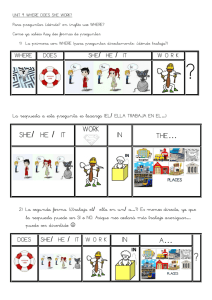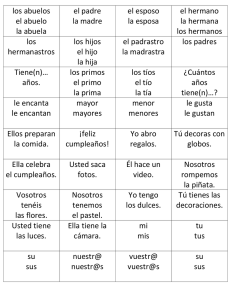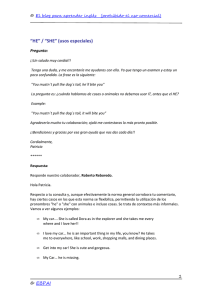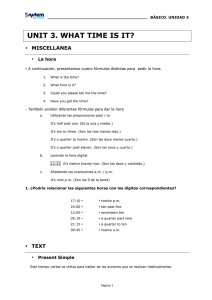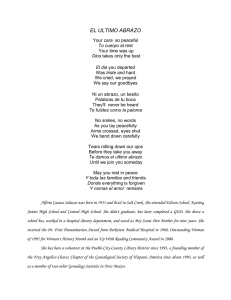UNIT 3. WHAT TIME IS IT?
Anuncio
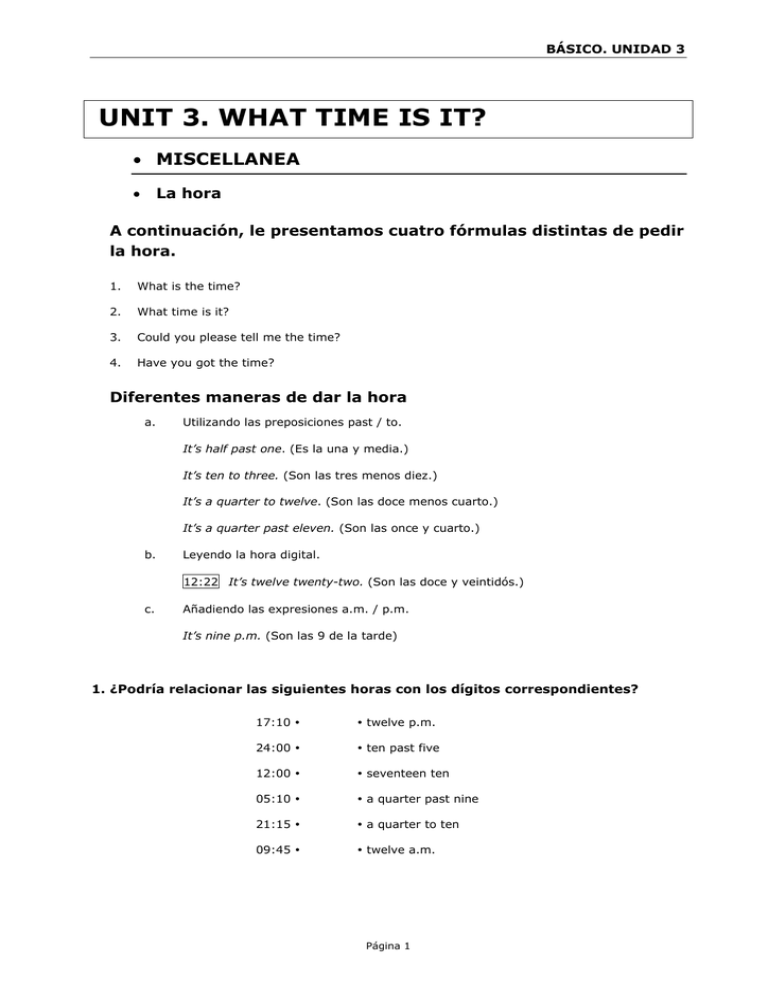
BÁSICO. UNIDAD 3
UNIT 3. WHAT TIME IS IT?
• MISCELLANEA
•
La hora
A continuación, le presentamos cuatro fórmulas distintas de pedir
la hora.
1.
What is the time?
2.
What time is it?
3.
Could you please tell me the time?
4.
Have you got the time?
Diferentes maneras de dar la hora
a.
Utilizando las preposiciones past / to.
It’s half past one. (Es la una y media.)
It’s ten to three. (Son las tres menos diez.)
It’s a quarter to twelve. (Son las doce menos cuarto.)
It’s a quarter past eleven. (Son las once y cuarto.)
b.
Leyendo la hora digital.
12:22 It’s twelve twenty-two. (Son las doce y veintidós.)
c.
Añadiendo las expresiones a.m. / p.m.
It’s nine p.m. (Son las 9 de la tarde)
1. ¿Podría relacionar las siguientes horas con los dígitos correspondientes?
17:10 y
y twelve p.m.
24:00 y
y ten past five
12:00 y
y seventeen ten
05:10 y
y a quarter past nine
21:15 y
y a quarter to ten
09:45 y
y twelve a.m.
Página 1
BÁSICO. UNIDAD 3
• TEXT
•
Present Simple
AFIRMATIVA
Singular
Plural
I work
We work
you work
You work
He / She / It works
They work
Este tiempo verbal se utiliza para hablar de las acciones que se realizan habitualmente. Los
verbos principales, es decir, aquellos que no son auxiliares ('to be' y 'to have got'), se conjugan de
la siguiente manera:
AFIRMATIVA
NEGATIVA
INTERROGATIVA
I work
I do not (don't) work
Do I work?
you work
You do not (don't) work
Do you work?
he/she/it works
he/she/it does not (doesn't) work
Does he/she/it work?
We work
We work
Do we work?
You work
You work
Do you work?
They work
They work
Do they work?
Como se puede observar, la conjugación se hace sobre el infinitivo del verbo al cual añadiremos
una '-s' para conjugar la tercera persona del singular. En el Present Simple los verbos principales
necesitan el verbo auxiliar 'do' para hacer las formas negativas e interrogativas:
El auxiliar 'do' recoge las características del verbo principal; por esto, en las formas interrogativas
y negativas de la tercera persona del singular He, She, It, la '-s' desaparece del verbo principal y
pasa al auxiliar: ‘does / doesn't’. Ejemplos:
Afirmativa: Margaret eats at home today.
Negativa: Margaret doesn’t eat at home today.
Normas de ortografía
Algunos verbos sufren cambios en la ortografía cuando se conjugan en tercera persona del
singular. Estos cambios son:
1.
Añadiremos -es cuando el infinitivo del verbo acabe en -ch, -sh, -s, -x, -z, -o
watchÄwatches
pushÄpushes
kissÄkisses
relaxÄrelaxes
buzzÄbuzzes
goÄgoes
2. Los verbos acabados en -y precedida de una consonante cambian a ‘-ies’. En cambio, si la ‘y’ va precedida de vocal, no se produce ningún cambio.
studyÄstudies
flyÄflies
Página 2
pero:
playÄplays
BÁSICO. UNIDAD 3
•
Los pronombres objeto (object pronouns)
Existen dos tipos de pronombres: los que asumen la función de sujeto de la oración (subject) y
los que actúan como complemento directo, indirecto o preposicional (object).
Los object pronouns sustituyen a los sustantivos que hacen de complementos directo e indirecto.
En la lengua inglesa, a diferencia del castellano, estos complementos siempre se colocan detrás del
verbo al que complementan. Ejemplo:
We live near Tom but we don't see him very often.
(Vivimos cerca de Tom, pero no lo vemos muy a menudo.)
Los object pronouns deben usarse obligatoriamente detrás de cualquier preposición. Ejemplo:
Would you like to come with us?
(¿Te gustaría venir con nosotros?)
2. LISTENING. ‘Lidia and John’ Escucha atentamente las presentaciones de Lidia
y John.
“Hello! My name’s Lidia and I’m a
business woman. I’m 32 years old. I’m
married and I have one daughter. I live
in a flat in Barcelona. I want to learn
English because it’s the international
language of business”
“My name’s John Woods and I’m a hotel
manager. I’m 34 years old. I’m married
too and I have a son and a daughter I
live in a house in Reading”
Página 3
BÁSICO. UNIDAD 3
3. LISTENING. ‘Andrew and Sarah’. Ahora escucha atentamente las
presentaciones de de Andrew Lloyd y Sarah Brown y lee los textos
correspondientes.
ANDREW
LLOYD
SARAH
BROWN
“This is Andrew Lloyd. He lives in a flat in London. He
works as a receptionist in the Monarch Hotel. He reads
Agatha Christie novels and watches sports on T.V. He
goes to the pub on Friday and Saturday nights. He
doesn’t drink beer but he loves cider. He has got a dog
but he doesn’t like cats. He stays in London for his
holidays.”
“This is Sarah Brown. She lives in a cottage near
London, with her parents. She teaches English in a
language school and at the hotel. She likes her job. She
reads a lot but she doesn’t watch T.V. On Saturday
mornings she goes walking. She always travels abroad
for her holidays.”
4. A continuación, completa las siguientes oraciones.
1.
She lives in a cottage near London. He ____________ in a flat in London.
2.
He is a receptionist. She ____________ as a teacher.
3.
She reads a lot. He only ___________ Agatha Christie novels.
4.
She ___________ TV. He __________ to the pub on Friday and Saturday nights.
5.
She likes walking. He ____________ watching sports on T.V.
6.
He stays in London for his holidays. She ____________ abroad for her holidays.
Página 4
BÁSICO. UNIDAD 3
• VOCABULARY
•
•
Jobs
Tourist development agent
Agente de desarrollo turístico
Events organizer
Animador turístico
Conference hostess
Azafata/auxiliar de congresos
Bellboy
Botones
Room maid
Camarera de pisos
Walter
Camarero/a de restaurante-bar
Cook
Cocinero
Travel agent
Empleado de agencia de viaje
Staff manager
Gobernanta/e de hotel
Tourist guide
Guía de ruta
Chef
Jefe de cocina
Store and wine cellar
Jefe de economato y bodega
Maître
Jefe de sala/maître
Clothes presser
Lencero lavandero planchador
Hotel recepcionist
Recepcionista de hotel
Wine Walter
Sumiller
Expert on tourist information
Técnico en información
turística
Verbs
Type
Play
Watch
Study
Read
Sell
Give
Finish
Escribir a máquina
Jugar, Reproducir
Ver, observer
Estudiar
Leer
Vender
Dar
Terminar
Página 5
BÁSICO. UNIDAD 3
• SELF-EVALUATION EXERCISES
5. Presente simple. Oraciones afirmativas. Relaciona la columna A con la columna
B para identificar cada profesión con la tarea que realiza.
A
1.
2.
3.
4.
1.
B
John is a Farmer
Alice is a Teacher
Oscar is a Waiter
Sarah is a Pilot
a.
b.
c.
d.
e.
f.
g.
i.
j.
k.
She works at the University.
She travels to a lot of countries.
He serves meals.
He works outside.
He grows potatoes.
She flies planes.
She marks exams.
He works in a restaurant.
He lives in the countryside.
He takes orders.
John is a farmer. He works outside.
2.
3.
4.
5.
6.
7.
8.
9.
10.
6. Completa las siguientes oraciones con alguno de los verbos del cuadro. No
olvides escribir la forma correcta del verbo.
Example : He’s a receptionist. He gives guests their room keys.
Type
play
watch
study
read
1.
He works in a book-shop. He ________ books.
2.
She is a secretary. She ________ letters.
3.
My friend ________ the guitar.
4.
Susan never ________ T.V.
5.
In June Graham ________ his studies.
6.
My mother ________ mystery novels.
7.
He ________ business administration.
Página 6
sell
give
finish
BÁSICO. UNIDAD 3
7. Completa las preguntas para las siguientes respuestas.
Example:
Where does Laura live? She lives in Barcelona.
1.
What ______________________? He’s a businessman.
2.
How old ______________________? She’s twenty-three.
3.
How many languages ______________________? Susan speaks two languages.
4.
How much ______________________? The Special Menu is three pounds fifty.
5.
Who ______________________? Mary ’s Peter’s wife.
8. Presente simple. Negativas. Completa las oraciones con los verbos entre
paréntesis.
Example:
My uncle ______ meat (not eat).
My uncle doesn’t eat meat.
1.
Susan _______________ apples. (not love)
2.
My hometown _______________ Bilbao. (not be)
3.
John’s sister _______________ Japanese. (not speak)
4.
Elisabeth _______________ History. (not study)
5.
Milan _______________ the capital of Italy. (not be)
9. What’s the time? Escribe las horas que muestran cada uno de los relojes que
mostramos a continuación.
1. _________________
4. _________________
2. _________________
5. _________________
Página 7
3. _________________
6. _________________
BÁSICO. UNIDAD 3
7. _________________
8. _________________
9. _________________
• OPEN EXERCISES EVALUATION
10. Escribe cinco frases con cosas que hagas todos los días. Usa el diccionario si
lo necesitas.
Ejemplo: I go to bed at 11:30 p.m. everyday
1.
2.
3.
4.
5.
11. Escribe conversaciones entre dos personas que hablan acerca de costumbres
diarias. Por ejemplo:
- What do you do?
- I work as a painter.
- Where is your car?
-
Página 8
